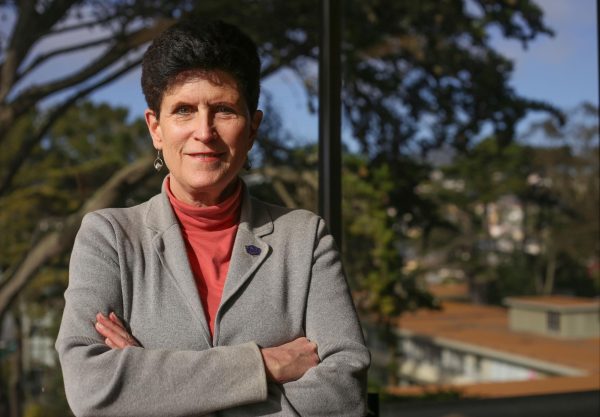How to Participate in Sexual Self-Care and Wellness
Taking care of your sexual health is one of the most important steps in your self-care routine. Bringing yourself in to get tested for sexually transmitted infections (STIs) may feel like the most embarrassing process in the world, but the truth is, there’s nothing to be ashamed of. If you’re not sure of where to start or if you should get tested, start by embracing your sexual health and ditching the self-shame.
How do you know if you have an STD/STI?

If you’re sexually active, you’re more prone to contracting an STI than you may believe. In a recent study done by the CDC, it was reported that one in five people in the U.S. has an STI.
“It’s a little bit more Russian roulette than people like to think,” said Nicole Benjamin, a public health nurse for Santa Cruz County Health Services Agency. Benjamin noted she was not authorized to speak for the agency but does have 20 years of experience.
Benjamin explains it’s not about how many people someone has slept with or who they’ve slept with, which is a stigma that still heavily weighs on society today.
It’s important to know that in most cases, STIs are usually asymptomatic while STDs are not. According to an article by Women’s Health, that is really the only difference between the two terminologies.
“Having an infection carries less stigma than having a disease,” said Ivy Chen, a lecturer with the department of Sociology and Sexuality Studies at San Francisco State University. “The term went through a rebranding to make it so that it might be mentally easier for people to be checked for an infection.”
One of the most common mistakes is assuming that you don’t need to get tested because you don’t feel sick.
“People see it as an ‘if it ain’t broken, don’t fix it’ kind of thing,” said Benjamin.
Sexual health isn’t something that affects only you. Getting tested whether or not you have symptoms also means you are taking responsibility as a caring partner. It is not only crucial for you, but for your past and future partners as well.

Chen also stated that many people hope their discomfort, if they’re lucky enough to be notified by their body, will just go away on its own. Although it may be hard not to indulge in googling symptoms or self-diagnosing, getting checked by a health professional is the best option for an accurate answer. Worrying is always scarier than knowing.
Don’t be ashamed
Taking care of physical health comes in all forms. It’s never too late to educate yourself and understand the risks. It can feel extremely uncomfortable to ask questions and be open about your sex life with a doctor or provider but, according to Benjamin, we may not always be getting judged the way we think we are.
“Our provider’s worry can sometimes come off as judgment,” Benjamin said. “It depends on the comfort level of people as a sexual being and what they think these diseases are in relation to their sexuality or personhood.”
Tyiana Catalino, a sex educator known as @prettywithlee on TikTok, says she was never educated on this topic when she was young. She now spends her time making videos about sexual health to educate her 1.4 million followers.
Catalino began her TikTok journey by creating videos about her pregnancy and the things that she never knew came along post-delivery. She started receiving a lot of positive feedback from people relating to her content. This led to children as young as 12 years old to 25-year-old adults asking her questions about sex, birth control, using condoms and hygiene.
“There aren’t enough people on social media that speak on this,” Catalino said. “I started thinking, how can I make it a habit for people to get tested?”
Catalino made several videos explaining different STIs and what they are, then shifted to encouraging videos about getting tested. Based on her knowledge and research, she recommends that people get checked at least once a month or every time they’re sexually active with a new partner.
Think of it like a dental check-up or cleaning. Not so bad now right?

De’Angelo Segovia, a 21-year-old Bay Area resident, is extremely open about getting tested and, like Catalino, speaks about his experiences on TikTok. Known on the app as @dtoneee, De’Angelo has made several videos in the past delving into the different sexual experiences that he’s had or advocating for the importance of getting tested.
“I think that this is a topic to expand on and make it more mainstream. No one should be ashamed of this,” Segovia said. “I’m an open book, I don’t really care what people think or what they say.”
Be honest
Being honest with yourself, your partner and your provider is the most basic yet important foundation when taking care of your sexual health.
“Public health is about prevention, communication and maintaining health,” said Chen.
Open communication, making sure to take care of basic sexual needs and being upfront and honest are all a part of embracing your sexual health. Not only do people struggle with bringing up these conversations to health professionals, but also to their partners. It can be hard to ask your partner to get tested or tell them that you have an STI, but it’s necessary.
According to Benjamin, this is one of the leading repercussions that comes from stigma. Some people may become offended or see it as an insult.
“They may think you’re calling them ‘sleazy’ or ‘dirty,’” she said. This is certainly not the case, but it is why some may avoid the testing process altogether.

According to Benjamin, another reason people avoid getting tested is that they would rather not know the results.
“For them, it’s better to be in denial,” Benjamin said.
How do we begin to normalize getting tested?
“If it’s something that everyone has to do, nobody is going to feel like they’re singled out as being ‘infected’ just because they seek out those services,” said Chen.
This can be achieved if everyone collectively starts to educate themselves on the stigmas that surround STIs to make testing a regular part of their healthcare routine. It’s a big systemic change, but that’s what it takes in order to encourage people to go, Chen said.
Another large aspect is access to care. It’s necessary to provide these services at multiple locations: such as community colleges, universities, high schools and health clinics; for those who do not have direct access to a provider or healthcare.
Having easier access to these services makes it as convenient as possible and “is almost like positive peer pressure,” Chen added.
If you receive a positive diagnosis for an STI, keep in mind that there is a treatment for every infection and some are entirely curable.
If you’re in need of testing, treatment or more information, Planned Parenthood has a testing locator at plannedparenthood.org. Health Promotion and Wellness at San Francisco State University also offers tips on prevention, as well as programs and workshops focusing on sexual health.

Gia Opsahl (she/her) is a writer and creative based in Monterey, California. She is a journalism major with a minor in race and resistance. Opsahl is extremely...











